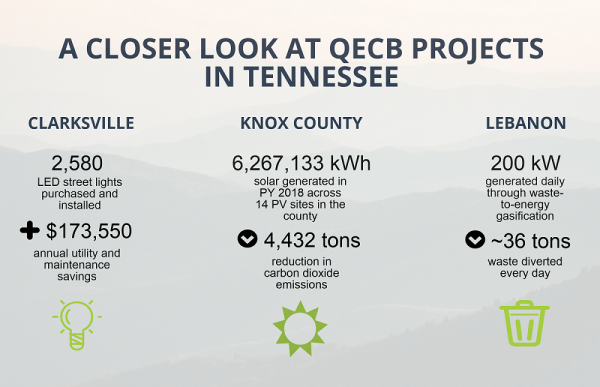Qualified Energy Conservation Bonds (QECBs)
Qualified Energy Conservation Bonds (QECBs) are low-interest federal bonds (via subsidy) that were available for issuance for qualified energy efficiency, renewable energy, and energy conservation capital projects. Under Tennessee statute, OEP is tasked with serving as the coordinator and administrator of the State’s QECB program in partnership with the Tennessee Local Development Authority (TLDA).
Tennessee’s QECB allocation totaled $64,676,000. In 2012, as required by Federal law, the State notified Large Local Jurisdictions (LLJs) of the amount of their allocations, which was based on their proportionate populations. The total amount identified for these fifteen cities and counties was approximately $36 million. LLJs choosing not to utilize their initial allocation were asked to reallocate their share to the State. These LLJ reallocations were combined with the State’s original allocation of $28.6 million for a total of $46,543,739. This amount was made available for qualifying projects through a competitive sub-allocation process. Entities eligible to participate in the program included all local government jurisdictions in Tennessee and public universities. A maximum of 30% of the aggregate bonds were eligible to be used for private activity projects.
On December 22, 2017, President Trump signed the Tax Cuts and Jobs Act (HR 1), which made widespread amendments to the Internal Revenue Code. Specifically, Section 13404 of HR 1 provided for the repeal of tax credit bonds, including QECBs. This amendment repealed QECB issuances effective after December 31, 2017. OEP continues to collect and report on data related to previously issued QECB projects. A comprehensive summary of projects financed with QECBs in Tennessee is included below.

The Metropolitan Government of Nashville and Davidson County issued its LLJ allocation ($6,440,000) in August 2012 for energy improvements to its multi-purpose indoor arena and other public buildings.
The City of Memphis combined its initial LLJ allocation ($7,014,356) and an additional sub-allocation of $3,657,644 to support three energy improvement projects under its Green Communities Program. The Crosstown Concourse issuance of $8,316,000 closed in February 2015. The Self Tucker/Universal Life and Knowledge Quest issuances, which had allocations of $2,015,300 million and $340,700, respectively, closed in April 2015. These three projects, detailed below, focus on building energy efficiency retrofits:
- Crosstown Concourse: The redevelopment of a 1.5 million square foot former Sears distribution center into a mixed use vertical urban village.
- Knowledge Quest: The redevelopment of a vacant apartment building into dormitory housing for an urban farming school.
- Universal Life Insurance Building: The redevelopment of a historic African American-owned insurance company building into a new office space.
The City of Lebanon issued a $3,500,000 sub-allocation in April 2015 to support the construction and installation of a waste-to-energy gasification unit, which provides nearly 200 kW of power to the City’s wastewater treatment plant and diverts 28-45 tons of waste (wood, tires, and biosolid sewer sludge) from landfills every day.
Knox County issued a $12,500,000 sub-allocation in June 2015 to support the installation of solar photovoltaics on 14 targeted sites across the county, notably on public school rooftops.
The City of Clarksville issued its LLJ allocation ($1,240,000) in March 2016 to support a street light improvement project, which resulted in the conversion of 2,580 street lights to Light Emitting Diode (LED) technology.
The City of Paris issued a $2,530,000 sub-allocation in June 2017 to support the upgrade of street lights to LED technology, conversion of lighting within select City‐owned buildings to LED lighting technology, the addition of intelligent thermostats on HVAC systems, the addition of energy‐saving vending machine controls, and an upgrade to the Civic Center's indoor pool dehumidifier.
Williamson County issued a $10,115,000 sub-allocation in September 2017 to finance energy conservation measures within 13 Williamson County School buildings.
The City of Memphis issued a $2,142,850 sub-allocation in September 2017 for a fourth Memphis Green Communities Program project, which supported energy efficiency upgrades to the Southbrook Towne Center. The project included the replacement of the roof with an energy efficient roof system, an upgrade of the building’s HVAC systems, and an upgrade to the building’s electrical power grid.